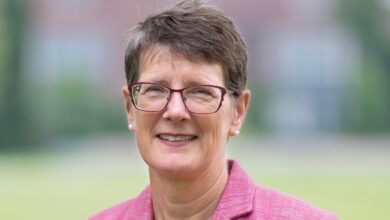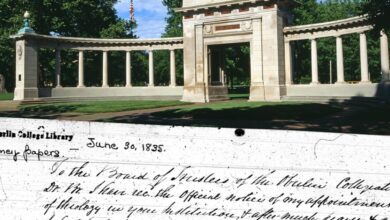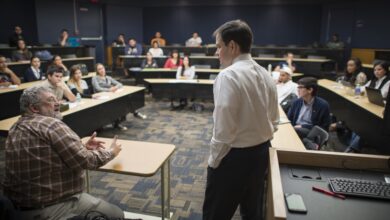U. of South Carolina Wants to Rename Buildings. State Politics Will Stop It.

[ad_1]
A commission at the University of South Carolina recommended on Friday that the names of 11 people who were slaveowners, fought for the Confederacy, or held racist beliefs be removed from campus buildings, including that of the late U.S. Sen. Strom Thurmond, who supported segregation for much of his political career.
To many on the flagship campus, in Columbia, it felt like a victory at first. But there’s no political path forward to actually removing Thurmond’s name or any others, at least for now.
University leaders say their hands are tied by a state law — the Heritage Act — that requires a two-thirds supermajority of the state legislature, controlled by Republicans, to approve any changes in the names of public buildings. Current legislative leaders have made clear that such proposals won’t go anywhere.
It’s a frustrating predicament for many at South Carolina. University leaders say they’re committed to racial progress. Those promises ring hollow, several students and alumni said, when campus buildings still honor Thurmond and others who held offensive views.
South Carolina isn’t the only university facing political pressure in debates over controversial names and monuments. But at a time when many colleges have renamed buildings, South Carolina seems stuck in place.
Harris Pastides, the university’s interim president, confirmed on Wednesday that name changes were off the table. “State law currently prevents us from changing those names, and we will follow the law,” he wrote in a message to the campus.
The university’s Board of Trustees, appointed by the legislature, would also have to sign off on such changes, and Pastides gave no indication that he’d send the commission’s naming recommendations to the trustees. He said only that the board would develop policies for naming future buildings.
Pastides said he was committed to “contextualizing the full history of the university,” and would create an “implementation group” to carry out other recommendations in the commission’s report, like new educational efforts about the university’s history.
Another complicating factor for South Carolina is that the president who had spearheaded the commission, Lt. Gen. Robert L. Caslen Jr., resigned in May after plagiarizing a commencement speech.
Caslen’s credibility had already taken a hit at his appointment, in 2019, which was marred by concern over how politics had influenced the process; the state’s governor, Henry McMaster, publicly lobbied the university’s trustees to pick Caslen. After Caslen resigned, Pastides, who had been president from 2008 to 2019, took over as interim leader.
A Lightning Rod
The university’s debate over Thurmond — whose name appears on the campus fitness center — isn’t new, but it has swelled in the year since George Floyd’s murder. Current and former college athletes and Dawn Staley, the Hall of Fame women’s basketball coach, have been among those speaking out against the naming. Thurmond, who represented South Carolina in the U.S. Senate for half a century and died in 2003, is both beloved and despised.
Thurmond vocally supported segregation for decades. His supporters say that Thurmond’s views changed later in his life and that he helped the state’s African American community.
But Thurmond had many problems, the commission noted in its final report. He set a record for the longest U.S. Senate filibuster ever, in opposition to the 1957 Civil Rights Act; had a sexual relationship with an African American maid that resulted in a child whom he never acknowledged; and faced several sexual-harassment claims. Thurmond “never publicly apologized for his history of segregation or admitted wrongdoing,” the report said.
The Thurmond fitness center wasn’t the only building name scrutinized by the commission; the group also recommended axing the names of three Confederate generals, four slaveowners, and two segregationists. But he was the biggest lightning rod. Several university trustees were on the commission and expressed reluctance about the possibility of removing Thurmond’s name. According to The Post and Courier, at least five board members donated to a political-action committee for Thurmond’s re-election campaigns.
Communications among university leaders made clear the tightrope they were treading. According to emails first obtained via a public–records request by The Post and Courier, Caslen, the former president, wrote to Pastides in August 2020 that the debate over renaming the Thurmond fitness center “will be a head-on train wreck” and that “we’ll need to mitigate the fallout.” (Pastides was a co-chair of the commission until he became interim president.)
“We can try to deflect it,” Caslen wrote, “but I suspect we’ll not be able to.”
In June, after Floyd’s murder inspired a wave of new demands to drop Thurmond’s name, university leaders decided, as a “compromise,” to proceed with removing a different controversial name: that of J. Marion Sims, known as the father of modern gynecology, who carried out experiments on enslaved Black women without anesthesia. Sims’s name has long adorned a women’s dorm at the university. “We must act now,” Caslen wrote in an email to David Seaton, a prominent university alumnus. Renaming the Sims dorm, Caslen wrote, “will help rebuild much public trust that our board desperately needs.”
Caslen, Pastides, and others strategized behind the scenes to deal with potential student protests and campus frustration about Thurmond and other names. They often responded by pointing to the commission as evidence that they were taking action.
Jesse L. Kass, an associate professor of mathematics, said in an interview with The Chronicle that he felt as if the commission had been set up primarily as a distraction. “My view on the situation is, the trustees are very strongly against renaming buildings for political reasons,” Kass said. “They want to have that issue addressed by having the administration shut down campus discourse.”
Kass said he was also frustrated by what he believed was a lack of transparency from university leaders about how the commission worked and a lack of opportunities for the public to engage with the group — which he said reflected larger problems with shared governance on campus.
The commission got off to a slow start, meeting three times in its first year, according to public records. The group’s energy seemed reinvigorated after Floyd’s murder, with several public forums taking place last fall. But in February, student leaders on the commission sent a letter to Caslen saying they felt as if the commission was dragging its feet. They threatened to quit.
“The longer we continue without action, the more this university will lose the trust of students, alumni, faculty, and staff,” wrote Issy Rushton and Hannah White, then the student body’s president and vice president. The commission then quickly voted on criteria for renaming buildings and opened the door to recommending the removal of Thurmond’s name.
In an interview, White said she had a great experience working with the researchers, historians, professors, and community leaders who were in the group. She had spoken out because she was worried that their hard work wouldn’t be put into action. There was “a lot of ambiguity,” she said, about what the commission was supposed to be doing.
Now, White said, there’s more ambiguity about what the university will do with their recommendations.
Forging Ahead
Despite the circumstances, commission members said they believed their group had done crucial work.
They spent two years extensively researching campus buildings and landmarks, coming up with criteria for replacing names, and determining which names to recommend for removal. They also devised a list of more than a dozen notable African Americans who could be honored on future buildings. The final report runs to more than 300 pages.
While educating people about the university’s history isn’t enough, it is one positive step, said Christian K. Anderson, an associate professor of higher education who was on the commission. “The Heritage Act is in place. We know that. We’ve always known that,” said Anderson, who studies the history of colleges and universities. “What would the alternative have been — well, that’s in place, so let’s not do anything?”
Anderson plans to bring some of the commission’s work into his courses. And he’s going to work with White to help finalize a campus tour she designed that’s focused on African American experiences at the university. Even if building names can’t change, “we can still tell the story behind the names,” Anderson said.
Toby Jenkins-Henry, an associate professor of higher education and director of the university’s Museum of Education, said state politics shouldn’t stop the university from doing what is within its control: using educational programs, campus tours, and other methods to counter the offensive names. After all, she said, there’s no guarantee that this level of institutional momentum and resources will exist for diversity and inclusion in the future.
Some students, faculty members, and alumni want the university to put pressure on the Board of Trustees and the legislature to act, despite the political barriers.
As long as the law is in place, it’s easy to feel as if there is no hope for change. “A lot of people have given up the fight,” said Jazmyne McCrae, who recently earned her bachelor’s and master’s degrees from South Carolina. That’s how McCrae felt for a while, too. Years ago, as an undergraduate, she wrote a letter to Pastides, then president, asking him to remove the name of Sims from the dorm. “It went nowhere,” she said.
Now McCrae is vice president of Repeal the Heritage Act, a nonprofit made up mostly of South Carolina and Clemson alumni who are lobbying against the law. In the coming weeks, she said, she plans to ramp up pressure on university leaders. “We need them to be bold and lead with us,” she said. (A lawsuit challenging the law’s constitutionality is pending before the state Supreme Court.)
In the immediate future, Caley Bright, a rising sophomore who leads the campus NAACP chapter, said she wanted to talk with Pastides, one on one. But if the name changes don’t move forward, she said, student activism will escalate.
As a freshman last year, Bright lived in the Sims dorm. “Why are we highlighting these so-called heroes for our school when they didn’t even want us here?” Bright asked. “That was really hard for me.”
Even though that’s the one name change that the university’s board has approved, the legislature hasn’t acted. So Sims’s name is still on the building.
[ad_2]
Source link






